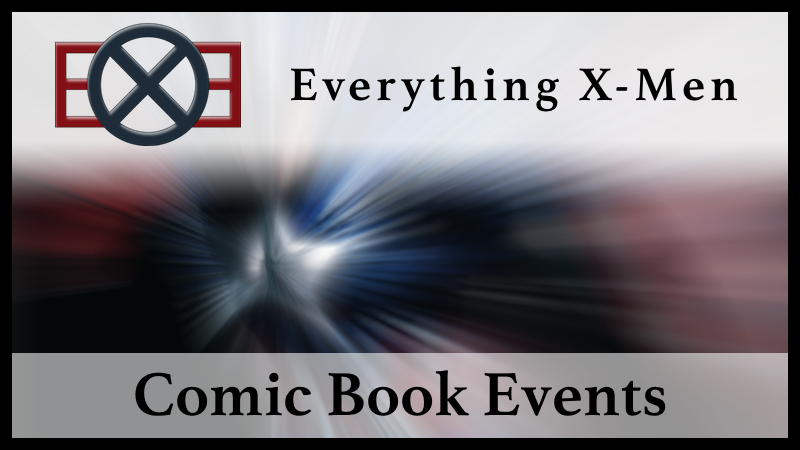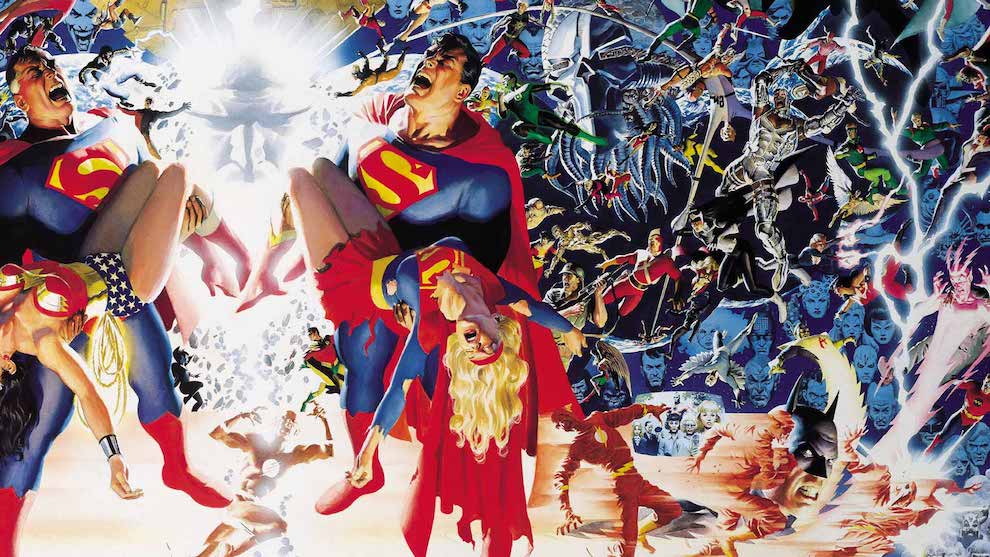
“Everybody knows that the boat is leaking
Everybody knows that the captain lied
Everybody got this broken feeling
Like their father or their dog just died
Everybody talking to their pockets
Everybody wants a box of chocolates
And a long-stem rose
Everybody knows”
(“Everybody Knows,” Leonard Cohen)
Why do we have events in the world of comics? Well, profit, mainly. But there has to be something else, right? Today we take a look at some of them and try to find out what makes them unique and lasting.
The Search for Meaning

I may sound like a grumpy old man, but nowadays events arise from every corner. At least regarding the big two of the industry (Marvel and DC). I feel like Marvel does a big, universe shattering event every other month and if possible, multiple events at the same time. DC handles them it a bit better (?), but that is a very subjective feeling. This is one of the reasons why I like reading stories from Image, Boom, and other publishers so much. They just tell good stories. They don’t renumber their runs every three years. And that what it’s all about: good stories. To be honest, I read events, but mostly not during the time they are happening. Collected editions are a great way to read them in an afternoon and still get the same experience.
I combined my experience with the research I did on some events because I wanted to figure out which events were more successful. But before we get to that, let’s talk about their purpose, besides making a shit load of money for their publisher.
As we discussed in my “The Ages of Comic Books” article, superheroes as we know and love them have existed since 1938 and the birth of Superman. To have superheroes fight for justice is fine, but the real fun begins when you put some of them together: fighting a threat they could not defeat alone; standing together at the edge, staring in the abyss, but fighting on nevertheless; making sacrifices for the greater good, for a better tomorrow, so the human race can survive, creating a better world. At least that is the dream. But there are threats and antagonists you cannot just defeat: antagonists controlling the abyss, embracing it. And in order to win the day, you, as the hero, have to embrace it as well. Walking a knife-edge. Those are personal threats to overcome like we saw in 2017 with the DC event “Metal.”
Other events change entire universes or even multiverses. The antagonist does not challenge one mere hero. She threatens every living being. He hungers for planets and star-systems, destroying reality as we know it and reshaping it in her own will. Those events don’t just need a team of superheroes but every single superhero and maybe even the villains out there.
In my understanding, the first event was DC Comic’s “Crisis on Infinite Earths.” Or, at least it was the first event to deserve the name and which is still considered one of the best-executed events there is. As of writing this article, I haven’t read the event (yet), but I certainly will. Take Goldstein’s review, for example. He does not spoil anything that is happening in the event, and after reading the review, you want to experience it yourself.
The Gold Standard
“Crisis on Infinite Earths wasn’t the first Crisis in the DCU, but it became the single defining event in the long history of the publishing giant. Crisis took 50 years of continuity, nearly a half-dozen different universes and hundreds of characters, squeezed them all together and came out with one shiny new playground that has existed for the past two decades” (Goldstein, 2006).

Every single event needs a reason to exist. Without this reason, you just have a bloated story: something familiar made into an eight or even twelve-issue limited series with a bunch of tie-ins nobody wants and an ending nobody needs. At the end of the event, there should be something different. It does not have to be something big. It can be as small as a change of heart in a character. The adventure he or she had throughout the event changed his or her perspective. Or, it can be as big as a new status quo of the entire multiverse.
DC Comic’s “Crisis on Infinite Earths” was the latter. Marv Wolfman took on an impossible task: taking 50+ years of DC’s history, with all the baggage and stuff, tearing it apart just so he can put it back together. He created a world new readers could understand and old readers could appreciate. The keyword for something like this is continuity. Marvel and DC (as well as Valiant) have a shared universe, which means every adventure takes place in the same world or at least in the same multiverse. Writers, editors, and artists have to keep this in mind when characters die or places are destroyed. Or, as Friedenthal (2011) puts it in his very detailed essay:
“Continuity in a comic book superhero universe is the meta-narrative created out of the sum total of meetings, relationships, battles, births, deaths, and other twists of plot and characterization that have taken place within that universe.”
What Does a Good Event Need?
The following list, by all means, does not intend to be a complete list of requirements every single event needs to have to be successful. Every event is different from the other. However, meeting at least some of these requirements guarantee a more effective event, otherwise the event has no reason to exist or just feels wrong and out of place.
- Do not drag other titles into this mess.
This is my personal #1 rule regarding events. No matter how bad or good your event might be, do not drag other titles into it (at least not for an extended period of time). Marvel definitely broke this rule with their Secret Wars event and their Civil War II event a couple of moons ago.
I use Marvel Unlimited to read the X-Men titles for this series, and I like to go through the new additions each week. I feel like for months almost all the new titles had something to do with the events mentioned above. It was frustrating. Why should I read any of those titles when they seemingly have something to do with an event I don’t care about? A good example is the Convergence vent by DC from a couple of years ago. For two months this event took over every single DC book. After that they were done with it (another reason for the event was that DC moved from one coast to the other, but that’s another story).
- Keep it simple.
By this, I mean the general approach towards the story itself. You can tell a complex, world-shattering, or intimate story all you want. However, if someone reads the event years later or does not has a 25-year relationship with the characters, they should be able to understand the premise and consequences, nevertheless. House of M is a good example of that. I didn’t really read any Avengers comics before and just recently started with the X-Men, but the emotional weight of the story was there regardless. Annihilation by Marvel is also a good example. It is a great limited series involving exciting characters, and, though it is cosmic, the struggles and punches of the story hit every time.
- Don’t miss the shipping dates.
 Marvel missed some of the shipping dates of previous events by months. This is a no-brainer no-no. Granted, artists can get sick or something else can come up, but if you don’t have a bit of a buffer, that’s on you. A great example is the 52 event by DC. It was a year-long event with new issues every week. That’s 52 issues! And they didn’t miss a single week. That is awesome. On the other hand, DC changed the release schedule for “Doomsday Clock,” and I feel like this event will be done when I retire.
Marvel missed some of the shipping dates of previous events by months. This is a no-brainer no-no. Granted, artists can get sick or something else can come up, but if you don’t have a bit of a buffer, that’s on you. A great example is the 52 event by DC. It was a year-long event with new issues every week. That’s 52 issues! And they didn’t miss a single week. That is awesome. On the other hand, DC changed the release schedule for “Doomsday Clock,” and I feel like this event will be done when I retire.
- Don’t do the “WILL THIS EVENT CHANGE THE COMIC BOOK UNIVERSE FOREVER?” tease.
Sometimes it feels like Marvel and DC do not know the meaning of the word “forever.” It does not mean for the next two months and then we are back at the status quo. What intrigued me the most about the “Crisis on Infinite Earths” event was the fact that almost every review wrote something like: the effects of the event were long-lasting or can still be felt today. This is the utilization of “forever.”
Take Marvel’s Battleworld as another example. I read some reviews and listen to podcasts regularly, but I cannot tell you what happened to Battleworld. With a new earth reimagined by Doom, I thought this was supposed to be the new status quo, or at least exist for a couple of months or trigger a new event, maybe. What happened? I am asking! Please tell me in the comments below…
- Be true to the characters, and let them make sacrifices.
 Stay true to the characters themselves and also their motivations. Why are they doing what they are doing? If a character like Captain America faces an antagonist he cannot defeat (which he would do without a second thought, just so his friends can come up with something else in the meantime or to save one civilian), then let him die heroically. Apparently “Green Lantern: Sinestro Corps War” and “Infinity Gauntlet” are great examples for that.
Stay true to the characters themselves and also their motivations. Why are they doing what they are doing? If a character like Captain America faces an antagonist he cannot defeat (which he would do without a second thought, just so his friends can come up with something else in the meantime or to save one civilian), then let him die heroically. Apparently “Green Lantern: Sinestro Corps War” and “Infinity Gauntlet” are great examples for that.
The thing is, if you want to tell a story of a hero gone rogue, then commit to it. Don’t quit on the story when it is already being published, as Marvel did with “Shadowland.” The main character of the story was supposed to be bad all of a sudden. They had reasons behind his actions so it would be believable. But at the last minute they decided to come up with another solution and pretend he was possessed. Why? Just so the character would be more easily redeemable?
Changing the Past
“Retconning, in fact, is the key way in which comic creators are able to combat the “oneiric” problems of serial storytelling pointed out by Eco, as it allows creators to rewrite the past of characters so that they pulled back from the death that each action moves them inevitably toward. Retconning is revision of the comic book universe to make that universe fresh and exciting for contemporary readers, but it also involves the influence of the past, as it directly inscribes itself upon that past” (Friedenthal, 2011).
Telling stories of a particular magnitude time and time again can be challenging. So, if you don’t have any original ideas at the moment, don’t force an event into existence, just so you make a bit more money. You have to earn the event on many different levels.
On the one hand, you have to commit to the story and everything in it. On the other hand, you have to earn the trust of the readers. You might have a lot of loyal readers who have been buying your stories for decades now, but there are also a lot of new readers out there as well. And maybe the event you are currently telling is their first one. They deserve the very best you can offer. Once you have lost this trust, it is tough to get it back.
Often times I think: just tell great stories. Events are not everything. Tell great stories of the characters we love; bring in new ones, and create unexpected team-ups. There can be something going on in the background if you’d like (e.g., DC’s attempt to bring in the Watchmen into their universe) but focus on the monthly stories first. Those are the ones creating a relationship between creator and reader. The events are just the topping.
Sources
- 30 MAY 2011 THE BEST COMIC BOOK EVENTS http://www.ign.com/articles/2011/05/30/the-best-comic-book-events?page=2
JOEY ESPOSITO, JESSE SCHEDEEN, ERIK NORRIS & MIGUEL PEREZ - http://www.ign.com/articles/2011/06/14/the-worst-comic-book-events 14 June 2011 BY JESSE SCHEDEEN, ERIK NORRIS, DAN IVERSON & MIGUEL PEREZ THE WORST COMIC BOOK EVENTS
- http://www.mtv.com/news/2621010/the-11-biggest-comic-book-events-ever/ THE 11 BIGGEST COMIC BOOK EVENTS – EVER
ALEX ZALBEN 03/10/2011 - http://www.english.ufl.edu/imagetext/archives/v6_2/friedenthal/ By Andrew J. Friedenthal 2011
- http://www.ign.com/articles/2006/01/07/crisis-on-infinite-earths-the-absolute-edition-review 6 JAN 2006 CRISIS ON INFINITE EARTHS: THE ABSOLUTE EDITION REVIEW BY HILARY GOLDSTEIN

![[REVIEW] GIANT SIZE AGE OF APOCALPYSE](https://geekd-out.com/wp-content/uploads/2025/06/IMG_2764-150x150.jpeg)
![[REVIEW] ‘ALWAYS BE MY MAYBE’ IS A FRESH VOICE IN ROMCOMS](https://geekd-out.com/wp-content/uploads/2019/06/Always-be-my-Maybe-poster-150x150.jpg)
